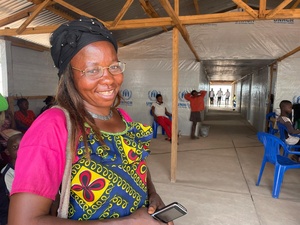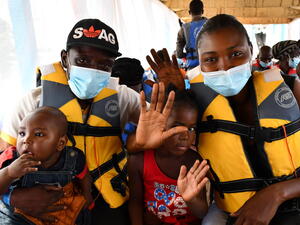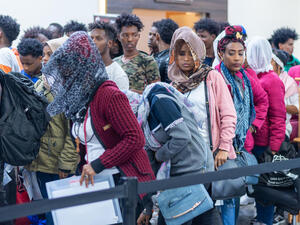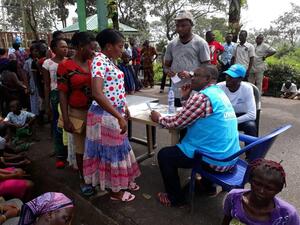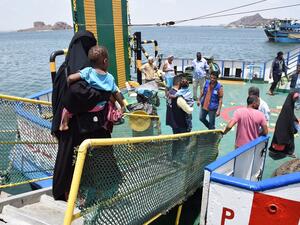Repatriation to Angola officially ends after 410,000 refugees go home
Repatriation to Angola officially ends after 410,000 refugees go home
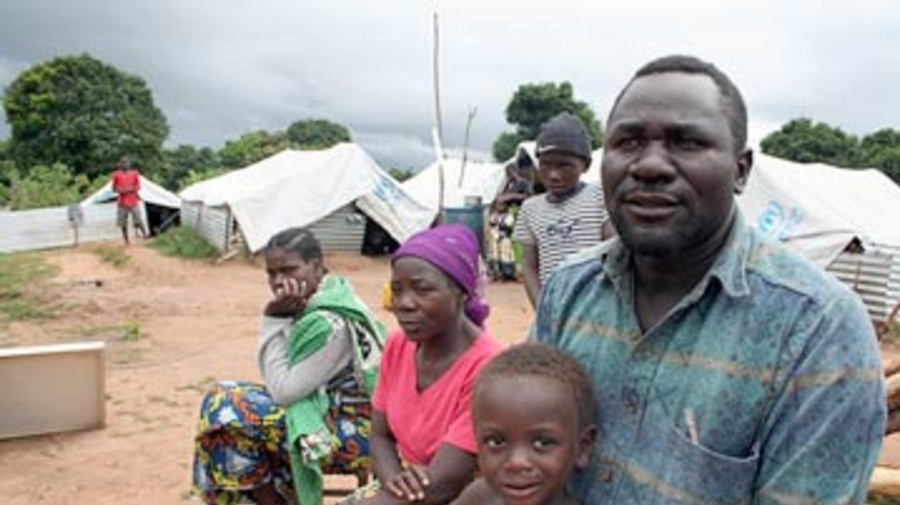
This family of Angolans were repatriated from Zambia with help from UNHCR. Since the end of the 30-year civil war in 2002, nearly 410,000 Angolans have returned home.
LUANDA, Angola, March 26 (UNHCR) - UN High Commissioner for Refugees António Guterres will attend a ceremony hosted by Angola on Tuesday at which regional leaders will officially mark the successful conclusion of the largest repatriation of refugees in Africa this decade.
Since the end of the 30-year civil war in Angola in 2002, when 457,000 Angolans were believed to be refugees in neighbouring countries, nearly 410,000 have returned home.
"More than 400,000 Angolan refugees living in camps and settlements came back home in safety and dignity, and were assisted by the government of Angola, the United Nations and the NGOs. At the same time, some four million internally displaced persons are estimated to have returned home," said Dario Carminati, the UNHCR representative in Angola.
Guterres, who arrived in Angola on Sunday, will meet with government officials and UNHCR's implementing partners on Monday and have a meeting with Angolan Prime Minister Fernando da Piedade Dias dos Santos on Tuesday morning. He will then participate in the formal ceremony marking the closure of the organised voluntary repatriation operation.
"The official ceremony will mark the completion of a coordinated effort by all concerned in this voluntary repatriation: UNHCR, Angola, the countries of asylum, the international community at large, civil society and last, but not least, the returnees themselves," said Christos Theodoropoulos, the head of UNHCR's refugee protection section in Angola.
Later in the day, Guterres will have individual meetings with representatives of the neighbouring countries. A separate technical meeting, hosted by Angola with participation by officials of UNHCR and neighbouring countries, will be held on Tuesday and Wednesday to discuss the future of those 47,000 Angolan refugees who did not return under the voluntary repatriation programme and remain in other countries.
The Angolan repatriation programme has dominated UNHCR activity in the region since the assisted return programme to Angola was launched in 2003 with the cooperation of regional countries. UNHCR and governments in bordering states, especially Zambia and the Democratic Republic of the Congo (DRC) which sheltered the bulk of refugees, organised the returns. Smaller numbers came from Namibia, the Republic of Congo, Botswana and South Africa.
In the four years of repatriation, UNHCR organised the return of 138,594 Angolan refugees: 43,345 in 2003, 51,673 in 2004, 28,524 in 2005 and 15,052 in 2006. The last of the 2006 repatriation groups arrived this month by chartered aircraft from the DRC.
During that period, UNHCR also assisted 116,856 Angolan refugees who returned on their own. A further 154,000 Angolan refugees are estimated to have returned home and reintegrated without UNHCR assistance.
Inside Angola, UNHCR staff focused on ensuring sustainable reintegration. In the areas of return, the reintegration programme constructed or rehabilitated 75 health posts, clinics and houses for nurses, plus 60 schools and teacher houses. Micro-credit programmes have helped 10,000 people.
To ensure reintegration activities continue, UNHCR assisted in preparing detailed needs assessments for the nine main municipalities where refugees returned. These have provided a basis for prioritising assistance in a country that had little infrastructure even before three decades of war destroyed what had existed.
"The challenge now is to ensure the sustainability of return and to make the returnees active subjects in the implementation of Angola's Sustainable Reintegration Initiative," said Theodoropoulos.
Securing the future of the returnees - as well as the millions of internally displaced who have come home - is a long-term development need that is beyond the resources or mandate of UNHCR. The government and its development partners are expected to take the lead in rehabilitation and reconstruction efforts as these programmes proceed.
UNHCR's presence in Angola will shrink with the end of repatriation and will focus in future on the continuing protection needs of refugees. That will be underlined by Guterres on Wednesday when he visits Viana refugee camp on the edge of Luanda. It houses thousands of Congolese refugees who have been in Angola for nearly four decades and UNHCR is working with the government to give them permanent residency.
By Manuel Cristovao Simao in Luanda, Angola


